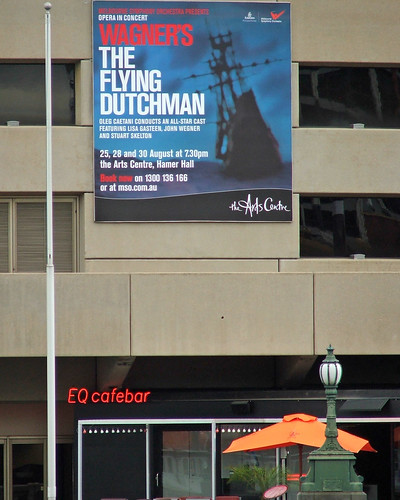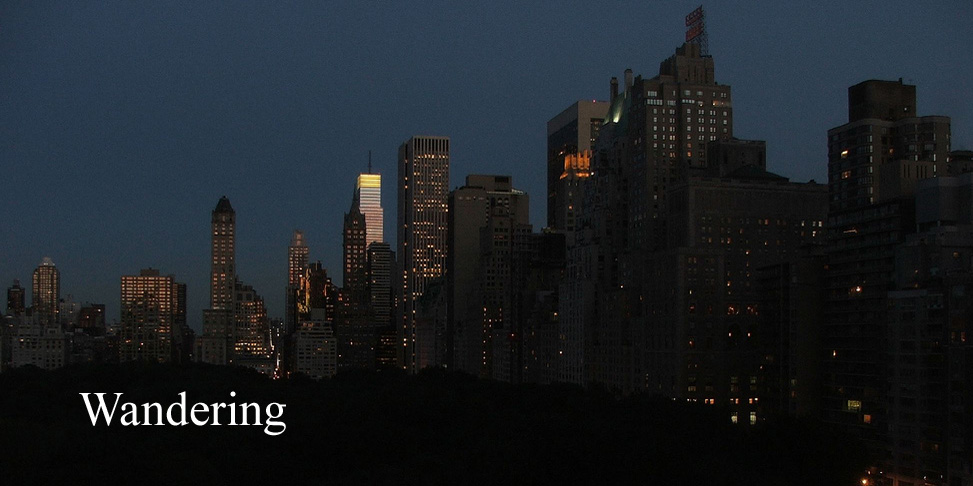
Thursday 28 August 2008.
A trip to Melbourne to see (or hear) Wagner's The Flying Dutchman in a concert performance with the Melbourne Symphony Orchestra conducted by Oleg Caetani.
The Opera
Daland is captain of a Norwegian ship which has just weathered a fierce storm. He leaves the steersman on watch while he and the crew rest. The steersman falls asleep at his watch; and while he sleeps a mysterious ship appears alongside. The Dutchman alights from it and sings of his fate to sail the seas forever unless redeemed by the love of a woman faithful until death. Every seven years he may return to land to seek the woman.
Daland returns to the deck to find the Dutchman, and, in return for the treasure on the Dutchman's ship offers him shelter at his nearby home and the hand of his daughter in marriage.
DALAND
joyfully taken aback
What? Do I hear aright? My daughter his wife?
He seems to mean what he says ...
I'm half afraid, if I remain wavering,
he will change his mind.
If I only knew if I were awake or dreaming!
Could there be a more welcome son in law?
I'd be a fool to let this fortune slip!
With delight I agree.
Meanwhile, on land, the womenfolk are busy spinning, with the exception of Daland's daughter Senta, who is found in dreamy contemplation of a portrait and who sings about the legend of the Dutchman whose portrait it is, and with whom she is obsessed.
Her nurse Mary asks:
Will you dream away your whole youth
in front of that likeness?
Senta's boyfriend Erik announces Daland's return and seeks reassurance of Senta's love. Erik tells of a dream which foretells what happens next: the return of Darland with the Dutchman.
Senta! Let me confide in you:
it is a dream! Listen to its warning!
But unfortunately for Erik:
SENTA
awaking suddenly, in the utmost rapture
He asks for me! I must see him!
With him I must perish!
ERIK
Oh horror! This all becomes clear!
She is lost to me! My dream told the truth!
He rushes off in horror.
When the Dutchman enters with Darland, he and Senta recognise each other and agree to marry.
SENTA
Am I now deep in. some wondrous dream?
The Norwegian sailors celebrate their homecoming, and taunt the crew of the mysterious ship to join them. Eventually the ghost sailors commence a dramatic and eerie account of the Dutchman's story and the Norwegian sailors flee. The Dutchman overhears Erik reminding Senta of her promise to him and, believing himself deceived, renounces Senta and returns to sea. Senta declares her love for the Dutchman and leaps off a cliff. The mysterious ship sinks and Senta and the Dutchman are transfigured.
I found a libretto on the internet and this let me find and note where dreams are mentioned. The last Opera Australia production of The Flying Dutchman in 1997, in its original form as directed by Barrie Kosky, emphasised Senta's dream to the extent of an opening tableaux in which she was terrorised by an upright piano and which presented the shipboard scene of Act 1 as taking place in Senta's room. The story is more complex than that: it's about mutual dreams or at least dreams that intersect so that all the dreamers are participating in one mystical experience. This is a commentary on the nature of myth, made all the more engrossing by the music of the opera.
A short Talk about the Opera
An hour before the concert Maestro Caetani gave a wonderful short talk on the opera illustrated by musical examples which he played on the piano. I find talks by musicians themselves most usually very interesting and instructive. This talk certainly was.
Since I had come to hear the opera performed with a large orchestra in full view, I was pleased to hear him say: " The music won't be disturbed by anything else."
The orchestra would include 16 first violins which would not fit into any orchestra pit apart from The Met and Bayreuth. And the singers would be in front of the orchestra, which overcomes the problem of the pit orchestra being in front of the singers and therefore too loud: "We conductors have to reduce the dynamics."
Mr Caetani saw the opera as essentially German: Wagner found his German identity in Paris, where The Flying Dutchman was composed, just as Gogol and Tchaikovsky found a Russian identity in Rome where Tchaikovsky composed the very Russian Queen of Spades.
Wagner had just heard a performance of Beethoven's Ninth Symphony by a very good orchestra in Paris and the impact of that performance far from Germany was an influence.
He said that the opening chords of The Flying Dutchman were like the opening of Beethoven's Ninth a "quint" his word I believe for a fifth. This intrigued me enough to listen to recordings of both and find the notes on the piano. I have been familiar with the opening chords of the opera and the Dutchman's motif for a very long time, but know nothing of harmony, musical notation or vocabulary. I enjoyed doing this - I hope I got the notes right - but I'm not sure if, and how, it helps in the overall experience of listening to music.
Mr. Caetani next explained that The Dutchman feels stable in the sea, unlike most of us; but when he puts his foot on the land - instability: " Where is the key. Where are we?" Something else to listen for; I didn't in the concert.
The next subject was the duet when Senta and the Dutchman finally meet. It's not a love duet in the usual sense: each sings of him or herself and of recognition. The bourgeoisie world is a reflection of Europe before 1848. Dutchman and Senta just see ideas.
But for Mr Caetani " the sea is the main character" . Every Wagner opera begins in water.
I haven't included everything mentioned in this short talk, but it gave valuable insights into The Flying Dutchman and the knowledge and involvement of the conductor in his work.
Performance
The performance itself lived up to the promise of the talk and my expectations. The overture and all that followed from the orchestra was thrilling. The presence of the large orchestra was enhanced by the placement of some instruments, horns in particular, off the stage so that the sound came from all directions.
The overall standard of the singing was high, but a feature of a concert performance is that the singers are very exposed and I noticed things which I may not have heard among the distractions of a stage performance. To begin positively, Senta's nurse Mary was sung by Sian Pendry who has appeared quite often in recent Opera Australia productions. She has a beautiful rich voice which I had not fully appreciated until now.
Senta was to have been sung by Lisa Gasteen who withdrew due to injury and we heard the German soprano Gabrielle Maria Ronge in a fine dramatic performance. She may not have the smoothest transition from mid to upper register but once there achieved excellent volume and one memorably piercing scream.
The Dutchman himself was sung by John Wegner, who sang the role the last time I saw the OA production (in a modified version) and who conveys the dark and mysterious character of the Dutchman perfectly. I thought I detected some head congestion, which may be why Mr. Wegner conserved his voice to allow a gripping finale at full volume.
Stuart Skelton was excellent as Erik. I heard him last year as Mitch in A Streetcar Named Desire and was keen to hear his voice in Wagnerian mode. He obviously enjoyed the performance as well, and while it was delightful to see him groove along with the dramatic orchestral music, it did take away a little from the, albeit minimal, acting and movement of the other performers.
Another singer new to me was the Icelandic bass Bjarni Thor Kristiansen who sang well and created a perfect gruff but naive persona for Darland.
The young Melbourne tenor Adrian Dwyer sang well as the steersman, although his voice was little smaller.
The choruses were seated round the organ galleries. They were impressive overall but seemed to lack some dramatic intensity, particularly in the brilliant passage in the third act where Wagner opposes the sailors and the Dutchman's crew each singing their own distinctive chorus. It could be because it was the first time I had heard it, but I still remember the spine chilling presentation of this moment in the OA production of 1967 (with the Dutchman's crew in skeleton suits), as the best I have heard, so far.
The MSO plans to issue a CD of the concert.





No comments:
Post a Comment